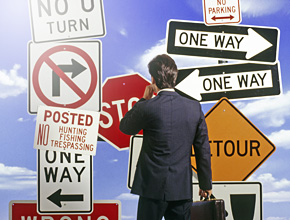Lessons in Decision-Making
 Forty years after his tragic death, President John F. Kennedy continues to fascinate. A new JFK biography hit the bestseller lists. His relatives — America’s royalty to some — are frequent newsmakers. An intriguing facet of his legacy involves his decision-making procedures. Some brought great success, others colossal failure.
Forty years after his tragic death, President John F. Kennedy continues to fascinate. A new JFK biography hit the bestseller lists. His relatives — America’s royalty to some — are frequent newsmakers. An intriguing facet of his legacy involves his decision-making procedures. Some brought great success, others colossal failure.
In 1961, after consulting with his advisers, Kennedy approved an invasion of Cuba by Cuban exiles to overthrow Fidel Castro. Advance press reports alerted Castro to the threat. Over 1,400 invaders at the Bahía de Cochinos (Bay of Pigs) were vastly outnumbered. Nearly 1,200 surrendered. Others died.
Top CIA leaders blamed Kennedy for not authorizing vital air strikes. Other CIA analysts faulted the wishful thinking that the invasion would stimulate an uprising among Cuba’s populace and military. Planners assumed the invaders could simply fade into the mountains for guerrilla operations. Trouble was, eighty miles of swampland separated the bay from the mountains. The list goes on.
“How could I have been so stupid?” Kennedy asked afterward. The fiasco left him feeling depressed, guilty, bitter and in tears.
When to rock the boat
Yale psychologist Irving Janis felt many of Kennedy’s top advisers were unwilling to challenge bad ideas because it might disturb group concurrence. “Groupthink” was his term for this flawed group dynamic in which decision makers are blinded by their needs for the self-esteem they get from being accepted members of a socially important insiders group. Fears of shattering warm feelings of perceived unanimity — of rocking the boat — kept some of Kennedy’s advisers from objecting to the Bay of Pigs plan before it was too late.
Presidential adviser Arthur Schlesinger, for instance, later lamented, “In the months after the Bay of Pigs I bitterly reproached myself for having kept so silent during those crucial discussions in the cabinet room. I can only explain my failure to do more than raise a few timid questions by reporting that one’s impulse to blow the whistle on this nonsense was simply undone by the circumstances of the discussion.”
Talk, debate, argue, disagree
In the 1962 Cuban missile crisis, the world teetered on the brink of nuclear war over the presence of Soviet missiles in Cuba. JFK had revamped his decision-making process to encourage dissent and critical evaluation. Internal debates allowed realistic scrutiny of alternatives: bombing, invasion, blockade or negotiation. The U.S. blockaded Cuba, demanded missile removal, and negotiated feverishly. Eventually, Khrushchev removed the missiles.
Robert Kennedy later wrote, “The fact that we were able to talk, debate, argue, disagree, and then debate some more was essential in choosing our ultimate course.”
How to avoid groupthinking
Not every group succumbs to groupthink. Nor does groupthink explain every bad group decision. (Decision makers can be inept, greedy or evil, for example.) But groupthink has serious ramifications for government, business, academia, neighborhood and family.
How to avoid groupthink? Determine to stand for what is right, regardless of the cost. Jesus of Nazareth, one who stood for what he believed was right, admonished his followers to “let your good deeds shine out for all to see, so that everyone will praise your heavenly Father.”
Determine to speak up when situations warrant. Structure groups to avoid blind conformity and encourage healthy debate. JFK once said, “When at some future date the high court of history sits in judgment on each of us, it will ask: ‘Were we truly men of courage — with the courage to stand up to one’s enemies — and the courage to stand up, when necessary, to one’s associates?’.”
Need guidance on making a tough decision? Contact a mentor and they will walk through the process with you.



i wlii be greatful for your help
[…] Lessons in Decision-Making […]
Group thinking is like the mirror’s blind spots while driving, it is just a part of what you believe to see.
I’ve found that group of individuals tend more to follow an idea even it is stupíd just because everybody follow it, but under the light of analsys it isn’t practical.
To think or not to think by ourselves that’s the dilemma.
The hard part comes when the situation is “5 or 10 Vs. You”
I have a quote for when things got difficult: you’ve got to fight for your right to party. and that means “Talk, debate, argue, disagree”.
Well it isn’t mine but beastie boys frame very good what I’m trying to say.
I wish the Indian Government of Congress knew the hovocs this ‘groupthink’ can cause. They elected a much tainted CVC, which many of them, knew would get caught sooner or later, corrupting the congress name even further. They did so because Sonia Gandhi and others bigwigs there thought it was right. If God ever gives me a chance, be it as a local community member or a cabinet member, I will never succumb to this groupthink disease.